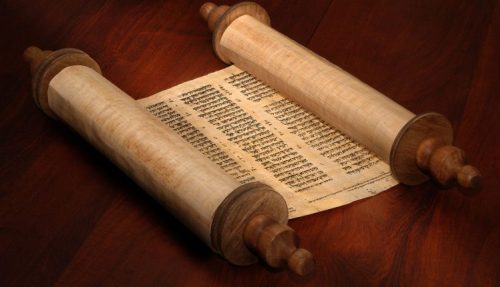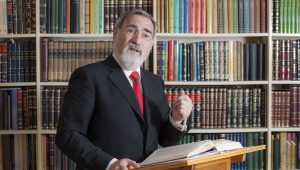
God appeared to Abraham by the oaks of Mamre, as he sat at the entrance to his tent in the heat of the day. He lifted up his eyes and looked, and, lo, three men were standing over against him; and when he saw them, he ran to meet them from the tent entrance, and bowed down to the earth… (Genesis 18:1–2)
Thus Parshat Vayera opens with one of the most famous scenes in the Bible: Abraham’s meeting with the three enigmatic strangers. The text calls them men. We later discover that they were in fact angels, each with a specific mission.
The chapter at first glance seems simple, almost fable-like. It is, however, complex and ambiguous. It consists of three sections:
- Verse 1: God appears to Abraham.
- Verses 2–16: Abraham meets the men/angels.
- Verses 17–33: The dialogue between God and Abraham about the fate of Sodom.
The relationship between these sections is far from clear. Do they represent one scene, two or three?
The most obvious possibility is three. Each of the above sections is a separate event. First, God appears to Abraham, as Rashi explains, “to visit the sick”[1] after Abraham’s circumcision. Then the visitors arrive with the news that Sarah will have a child. Then takes place the great dialogue about justice and the imminent punishment of the people of Sodom.
Maimonides suggests that there are only two scenes: The visit of the angels, and the dialogue with God. The first verse does not describe an event at all; it is, rather, a chapter heading.[2] It tells us that the events that follow are all part of a prophetic revelation, a divine- human encounter.
The third possibility is that we have a single continuous scene. God appears to Abraham, but before He can speak, Abraham sees the passers-by and asks God to wait while he serves them food. Only when they have departed – in verse 17 – does he turn to God, and the conversation begins.
The interpretation of the chapter affects – and hinges upon – the way we translate the word Adonai in Abraham’s appeal: “Please Adonai, if now I have found favour in your sight, do not pass by, I pray you, from your servant” (18:3). Adonai can be a reference to one of the names of God. It can also be read as “my lords” or “sirs.” In the first case, Abraham would be addressing God. In the second, he would be speaking to the passers-by.
The same linguistic ambiguity appears in the next chapter (19:2), when two of Abraham’s visitors – now described as angels – visit Lot in Sodom:
And the two angels came to Sodom in the evening, and Lot sat by the city gates. When he saw them, he rose to meet them and bowing low, he said, “I pray you now, adonai, turn aside to your servant’s house and tarry all night and bathe your feet and you shall rise up early and go on your way.” (Gen. 19:1–2)
As there is no contextual element to suggest that Lot might be speaking to God, it seems clear, in this case, that adonai refers to the visitors.
The simplest reading then of both texts – the one concerning Abraham, the other, Lot – would be to read the word consistently as “sirs.” Several English translations indeed take this approach. Here, for example, is the New English Bible’s:
The Lord appeared to Abraham… He looked up, and saw three men standing in front of him. When he saw them, he ran from the opening of his tent to meet them and bowed low to the ground. “Sirs,” he said, “if I have deserved your favour, do not pass by my humble self without a visit.”
Jewish tradition, however, does not.
Normally, differences of interpretation of biblical narrative have no halachic implications. They are matters of legitimate disagreement. This case of Abraham’s addressee is unusual, however, because if we translate Adonai as “God,” it is a holy name, and both the writing of the word by a scribe, and the way we treat a parchment or document containing it, have special stringencies in Jewish law. If, by contrast, we translate it as “my lords” or “sirs,” it has no special sanctity. Jewish law rules that in the scene with Lot, adonai is read as “sirs,” but in the case of Abraham it is read as “God.”
This is an extraordinary fact, because it suggests that Abraham actually interrupted God as He was about to speak, asking Him to wait while he attended to the visitors. According to tradition, the passage should be read thus:
The Lord appeared to Abraham…He looked up and saw three men standing over against him. On seeing them, he hurried from his tent door to meet them, and bowed down. [Turning to God] he said: “My God, if I have found favour in Your eyes, do not leave Your servant [i.e. Please wait until I have given hospitality to these men].” [He then turned to the men and said:] “Let me send for some water so that you may bathe your feet and rest under this tree…”[3]
This daring interpretation became the basis for a principle in Judaism: “Greater is hospitality than receiving the Divine Presence.”[4] Faced with a choice between listening to God, and offering hospitality to what seemed to be human beings, Abraham chose the latter. God acceded to his request, and waited while Abraham brought the visitors food and drink, before engaging him in dialogue about the fate of Sodom. How can this be so? It seems disrespectful at best, heretical at worst, to put the needs of human beings before attending on the presence of God.
What the passage is telling us, though, is something of immense profundity. The idolaters of Abraham’s time worshipped the sun, the stars, and the forces of nature as gods. They worshipped power and the powerful. Abraham knew, however, that God is not in nature but beyond nature. There is only one thing in the universe on which He has set His image: the human person, every person, powerful and powerless alike.
The forces of nature are impersonal, which is why those who worship them eventually lose their humanity. As the book of Psalms puts it:
Their idols are silver and gold, the work of men’s hands.
They have mouths, but cannot speak,
Eyes, but cannot see;?
They have ears, but cannot hear, nostrils but cannot smell…
They that make them become like them,
And so do all who put their trust in them. (Psalms 115:4–8)
One cannot worship impersonal forces and remain a person; compassionate, humane, generous, forgiving. Precisely because we believe that God is personal, someone to whom we can say “You,” we honour human dignity as sacrosanct.
Abraham, father of monotheism, knew the paradoxical truth that to live the life of faith is to see the trace of God in the face of the stranger. It is easy to receive the Divine Presence when God appears as God. What is difficult is to sense the Divine Presence when it comes disguised as three anonymous passers-by. That was Abraham’s greatness. He knew that serving God and offering hospitality to strangers were not two things but one.
In one of the most beautiful comments on this episode, Rabbi Shalom of Belz notes that in verse 2, the visitors are spoken of as standing above Abraham (nitzavim alav), while in verse 8, Abraham is described as standing above them (omed aleihem). At first, the visitors were higher than Abraham because they were angels and he a mere human being. But when he gave them food and drink and shelter, he stood even higher than the angels.[5]
By choosing the most radical of the three possible interpretations of Genesis 18, the sages allowed us to hear one of the most fundamental principles of the life of faith: We honour God by honouring His image, humankind.
Shabbat Shalom
[1] Rashi to Bereishit 18:1; Sotah 14a.
[2] Moreh Nevuhim 11:42.
[3] See Shabbat 127a.
[4] Ibid. See also Shavuot 35b.
[5] Dover Shalom ad loc.; cited in Peninei H?assidut (Jerusalem) to Bereishit 18:2.
An international religious leader, philosopher, award-winning author and respected moral voice, Rabbi Lord Jonathan Sacks was awarded the 2016 Templeton Prize in recognition of his “exceptional contributions to affirming life’s spiritual dimension.” Described by H.R.H. The Prince of Wales as “a light unto this nation” and by former British Prime Minister Tony Blair as “an intellectual giant”, Rabbi Sacks is a frequent and sought-after contributor to radio, television and the press both in Britain and around the world.
Since stepping down as the Chief Rabbi of the United Hebrew Congregations of the Commonwealth – a position he served for 22 years between 1991 and 2013 – Rabbi Sacks has held a number of professorships at several academic institutions including Yeshiva University and King’s College London. In addition to his writing and lecturing, he currently serves as the Ingeborg and Ira Rennert Global Distinguished Professor at New York University. Rabbi Sacks has been awarded 17 honorary doctorates including a Doctor of Divinity conferred to mark his first ten years in office as Chief Rabbi, by the then Archbishop of Canterbury, Lord Carey.
Rabbi Sacks is the author of over 30 books. Among them, Rabbi Sacks has published a new English translation and commentary for the Koren Sacks Siddur, the first new Orthodox siddur in a generation, as well as powerful commentaries for the Rosh HaShana, Yom Kippur, Pesach, Shavuot and Sukkot Machzorim. His most recent work, Not in God’s Name: Confronting Religious Violence was awarded a 2015 National Jewish Book Award in America and was a top ten Sunday Times bestseller in the UK. Past works include: The Great Partnership: God, Science and the Search for Meaning; The Dignity of Difference: How to Avoid the Clash of Civilizations, winner of the Grawemeyer Prize for Religion in 2004 for its success in defining a framework for interfaith dialogue between people of all faith and of none; To Heal a Fractured World: The Ethics of Responsibility; and A Letter in the Scroll: On Being Jewish, winner of a National Jewish Book Awards in 2000. His Covenant & Conversationcommentaries on the weekly Torah portion are read in Jewish communities around the world.
In recognition of his work, Rabbi Sacks has received, among others, the Jerusalem Prize in 1995 for his contribution to diaspora Jewish life, The Ladislaus Laszt Ecumenical and Social Concern Award from Ben Gurion University in Israel in 2011, The Guardian of Zion Award from the Ingeborg Rennert Center for Jerusalem Studies at Bar-Ilan University in 2014, and The Katz Award in recognition of his contribution to the practical analysis and application of Halakha in modern life in Israel in 2014. He was named as The Becket Fund’s 2014 Canterbury Medalist for his role in the defence of religious liberty in the public square; won a Bradley Prize in 2016 in recognition of being “a leading moral voice in today’s world”; and in 2017, he was awarded the Irving Kristol Award from the American Enterprise Institute for his “remarkable contributions to philosophy, religion, and interfaith discourse… as one of the world’s greatest living public intellectuals.” In 2018, he was given the Lifetime Achievement Award by The London Jewish News in recognition of his services to the Jewish world and wider society.
Rabbi Sacks was knighted by Her Majesty The Queen in 2005 and made a Life Peer, taking his seat in the House of Lords in October 2009. Born in 1948 in London, he has been married to Elaine since 1970. They have three children and several grandchildren.

